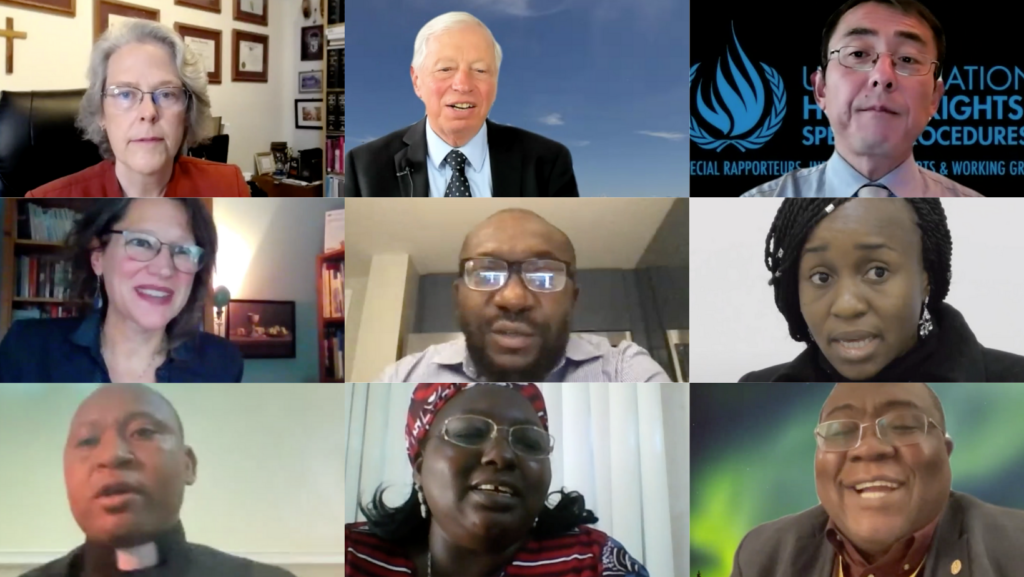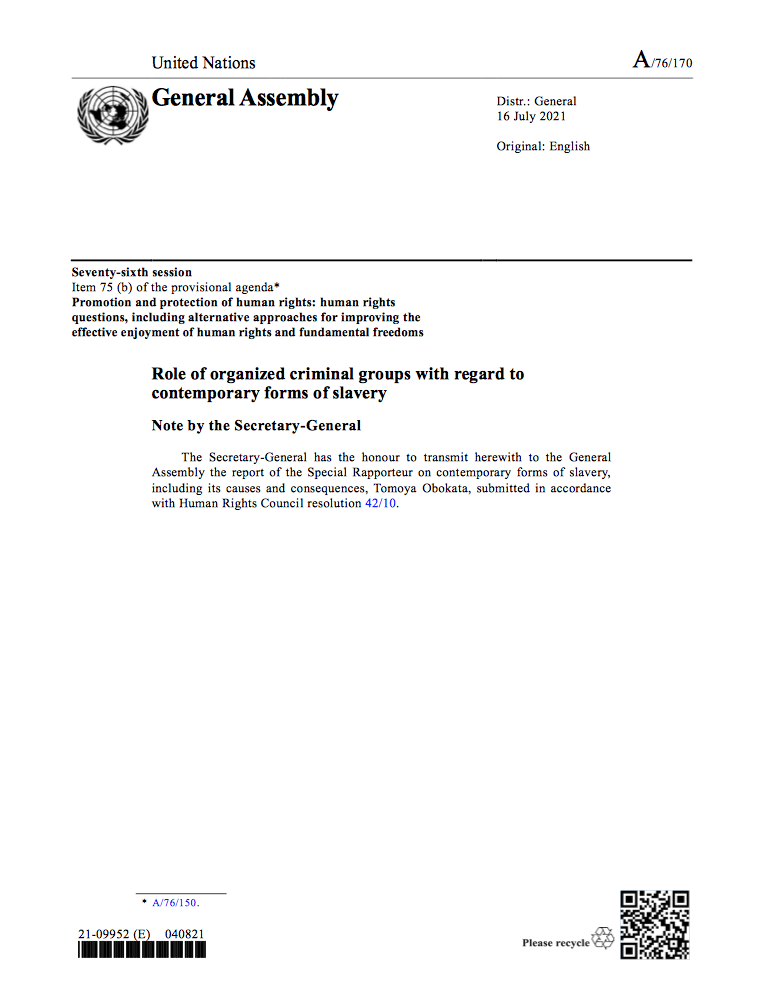UNICEF reports that criminal gangs have abducted 1,436 Nigerian children, with 16 children dead in 2021 alone and more than 200 still missing. International Committee on Nigeria (ICON) has, as of June 2021, reported over 2,557 individuals abducted and 2,197 killed by Boko Haram, Islamic State, West Africa Province (ISWAP), radical Fulani militants, and other criminal groups. A large portion of those abducted are women and girls, who are then subjected to domestic servitude, sexual slavery, forced marriage, and even coerced religious conversions.
Jubilee Campaign was honored to have had the privilege of hosting a side event to the United Nations General Assembly Third Committee, titled “On Stemming Role of Criminal Groups in Contemporary Slavery Within Nigeria, With a Focus on Women and Children”. Our event was focused on raising the astounding frequency of mass kidnappings of predominantly schoolchildren and women in Nigeria. Our event was co-sponsored by the Sovereign Order of Malta and moderated by His Excellency Professor Michel Veuthey, the Ambassador of the Sovereign Order of Malta to combat and monitor trafficking in persons. We welcomed expert speakers – such as Mr. Tomoya Obokata, UN Special Rapporteur on contemporary forms of slavery, and Ms. Hélène Fisher, Global Gender Persecution Specialist at Open Doors. We also welcomed a multitude of speakers who have worked on the ground in Nigeria offering assistance and aid to victims of abductions, slavery, and internal displacement. These include Ms. Fatima Njoku of Stefanos Foundation, Alheri Magaji of RADi, and Father Joseph Bature Fidelis of the Catholic Diocese of Maiduguri. We were also pleased to have Dr. Gloria Pulda of Leah Foundation, Dr. Oluwasayo Ajiboye, and Teyei Pam of International Committee on Nigeria.
Mr. Tomoya Obokata, United Nations Special Rapporteur on contemporary forms of slavery, including its causes and consequences, presented us with the major findings of his most recent report, Role of organized criminal groups with regard to contemporary forms of slavery. Though his report itself was not solely focused on Nigeria but raised relevant issues in countries across the world. Mr. Obokata provided many important remarks on Nigeria as a distinguished speaker at our event.
Mr. Obokata raised a special statement he, and other UN Special Rapporteurs, had issued in March 2021 calling on the government of Nigeria to, “ensure urgent rehabilitation of children who have been abducted by Boko Haram,” and expressing increasing concerns that Nigerian women and girls, specifically, have been kidnapped and subjected to domestic servitude and sexual slavery at alarming rates in recent years.
“First and foremost, states must strengthen their actions against corruption and obstruction of justice more effectively. All too often, impunity for organized criminal groups facilitated by these practices prevails and victims face obstacles accessing justice as is also the case in Nigeria.”
Highlighting the Causes and Diagnosing the Problem
Each of our speakers raised a plethora of causes of the unending and relentless trend of abductions and sexual slavery in Nigeria. Ms. Hélène Fisher of Open Doors highlighted that her organization focuses on the intersection of gender and religious persecution. As is the case in numerous nations, as well as in Nigeria, religious minority women face double vulnerabilities due to both their faith and their gender. While in Nigeria, general insecurity, financial struggles, and political tensions certainly play a role in criminal activity, faith and gender play a substantial role in abduction and slavery within Nigeria. Mr. Teyei Pam of International Committee on Nigeria (ICON) shed light on the rising trend in which organized kidnappings and sexual slavery of girls and women is becoming a major tactic of Fulani militants in addition to the aforementioned Boko Haram and Islamic State West Africa Province (ISWAP). Ms. Fatima Njoku of Stefanos Foundation, who has spoken at previous Jubilee Campaign events regarding justice and accountability in Nigeria, raised the issue that the Nigerian government’s focus on forgiving and rehabilitating former Boko Haram members while ignoring the treatment and justice for victims has only served to exacerbate the situation and embolden both Boko Haram and other criminal groups to conduct similar activity without fear of prosecution. Ms. Alheri Magaji of Resilient Aid and Dialogue Initiative (RADi), who spoke from her experience working on the ground in Kaduna State with internally displaced peoples, lamented that civilians can no longer be safe in their homes or in their schools, and that she has met numerous young women who were forced into domestic servitude by their kidnappers, often Fulani militants.
Providing Recommendations and Solutions
Many of our distinguished speakers also provided great recommendations to both the international community as well as the Government of Nigeria on how to combat and eradicate such practices of abduction and slavery. Dr. Gloria Puldu, Founder and President of Leah Foundation, urged the United Nations to place pressure on Nigeria to bring its own domestic laws on the rights and protection of women and girls into line with international human rights standards and conventions, “so that they can be held accountable when crimes are committed”. She also highlights the need for monitoring if the humanitarian and insecurity situation in Nigeria by the International Criminal Court. Dr. Oluwasayo Ajiboye, President of Redeemed Christian Bible College and Seminary, emphasized the need to “de-incentivize the criminal actors” and “remove their influence so that they are no longer able to impact what is happening on the ground” and cause so much destruction and fear among the civilian population. Father Joseph Bature Fidelis of the Catholic Diocese of Maiduguri, also provided suggestions, including: coordination between organizations operating in the United States and abroad with organizations who are on the ground in Nigeria and who are able to gather statistics and stories and recent/relevant information. He also stresses that “we must isolate, designate, prosecute” criminal groups engaged in abduction and slavery.
Presenting Jubilee Campaign’s Report
Ms. Ann Buwalda, Executive Director of Jubilee Campaign, announced the publication of our new report, Kidnapping & Slavery in Nigeria, which provides both general information – such as what constitutes slavery and slavery-like conditions – and more specific information with regards to Nigeria, including historical forms of slavery in the nation and broader region, as well as modern forms of slavery perpetrated by criminal groups such as Boko Haram.
Kidnapping-Slavery-in-Nigeria

